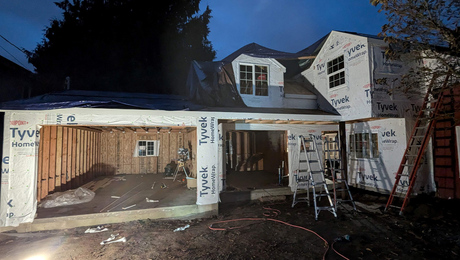Morning Folks,
I was in Lowes yesterday and got some pricing on point of use water heaters for the kitchen. They special order electric-units from Controlled Energy Corporation. There are four models: AE3.6, AE7.2, AE9.5, and AE12. The AE3.6, AE7.2, AE9.5 sell for the same $211.94 with 15-day (business day?) lead time, and the AE12 sells for $244.78.
I was thinking of ordering the AE9.5, which will require 8-Ga 40A 240/208V circuit, but this will not be a problem as I have access both to the panel (basement) and short-distance run to underneath the kitchen sink area. This unit raises water by 42ºF at 1.5-GPM, and 84ºF at half that rate. I think this is sufficient for the kitchen sink.
I was told (not necessarily the truth) that CEC owns or makes the gas units Bosch rebadges, and which lowes sells. The electric units will be a lot easier for DIY install, I think. Anyone use these products from this manufacturer (CEC)?
















Replies
"I know noothing," but will reply so as to bump you to near the top as you were about ready to fall off the edge of the page.
We use a lot of them in commercial applications.
Ther're not very efficient, but a lot of commercial office tenets don't pay for power directly they just pay rent. So they go with these units for breakroom sinks & lavs cheaper up front costs.
In my experience circ pumps on timers or thermostats save money on power & water usage in the long run.
"Ther're not very efficient,"Are you sure that you mean EFFICIENCY?They have zero losses when hot water is not being used.And when being used 99.9% of the purchased power is being used to heat the water and there is almost no lose in the several ft run from heater to the faucet.(99.9% because there will be a very small lose in the wiring.)http://www.controlledenergy.com/html/powerstar_new/design_features.html
OK true- bad choice of words.
I should have used cost effectiveness, but then again in my neck of the woods gas is a cheaper energy source than electric even though most of our electricity is hydro.
in my neck of the woods gas is a cheaper energy source than electric
You are not in Atlanta, are you? If you were you wouldn't be saying this. While I like NG a lot (heck, I wanted a NG line run to my LP grill), it is not cheap, get's farther from 'cheap' in the Winter, and a nation DOE report says its going to be 56% more expensive than the Winter 'norm' for this Winter.
Careful: there's a lot of electricity made with natural gas-fired turbines. If you're betting that your electric bill will be less than your gas bill, just wait a while for the electric market to catch up.
It's just plain stupid to burn a fuel to make steam to run a turbine to generate electricity, then transform it up and down voltage and radiate half of it into space as radio waves, only to end up using it to make HEAT again.
Good question as to efficiency though. Unlike up here where you're heating at least half the year, that heat "wasted" by inadequate insulation in your water heater and pipes is actually wasted rather than merely supplementing your furnace's output. Worse than that, your A/C has to remove it in summer. So when you take that into account, electric hot water on demand might seem to be OK. Of course if you use it in addition to a normal reservoir hot water heater for the major users like showers and baths, I doubt you've gained much. Regardless, it's still a wantonly inefficient way to make heat.
I'm not ignoring the basics of energy production. I'm strictly looking at the costs to me. And its only about having warm water at the kitchen tap so I don't have to wait the 1.5-2 minutes for water to get from the tank to the tap.
In the Summer, this isn't too much of a problem as the standing water is usually above Earth/frost. As a result, I can begin washing my hands when cooking/cleaning/etc. immediately. But in the Winter, that tap water starts around 55ºF and takes 1.5-2 minutes to change. If it is the start of the day, its warm water--which again means it is fine for washing hands, etc.
But, I cannot ignore the facts that a) I'm on an electrical co-op and have cheaper rates than those on GA Power, nor b) that NG is expensive for me in my locality and expected to increase by 56% this Winter. But this has nothing to do with THIS thread outside of the fact that its not a choice I'm looking at.
I guess since no one has familiarity with these in the home, its a dead thread. Thanks everyone.
You can install these undersink flash heaters at the end of long runs and feed them from the main heater hot water line instead of the cold water line. They will heat the water initially until hot water arrives, then the theromostat control will automatically cut back power.
Their only limitations are the minimum and maximum flow rates for a particular model heater. Several companies also sell small, 2-4 gallon electric tank heaters that can be used the same way, and they don't have the flow restrictions of a flash heater. Yes, they will "waste" some energy because the stored water in the tank will cool at 1F-2F per hour, but it's probably no more than the heat lost in a recirculation system.